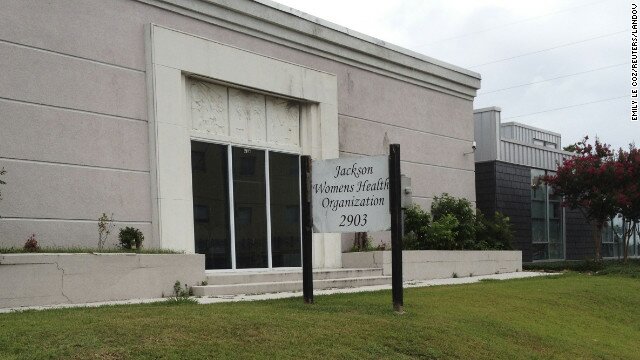Mississippi’s only abortion clinic faces threat of shutdown
By Tessa

By Rich Phillips, CNN
updated 3:56 PM EST, Wed November 28, 2012
The owners of Mississippi’s only abortion clinic are headed back to federal court in another attempt to stop a new state law which could close its doors — effectively banning abortion in the state.
The Jackson Women’s Health Organization filed for a preliminary injunction Wednesday to delay enforcement of the new law. Clinic officials say House Bill 1390, which was signed into law in April, imposes unnecessary guidelines and requires abortion doctors to have admitting privileges at a local hospital. The clinic’s doctors have been unable to gain those privileges.
“We’ve done everything we can to comply with this law and have been shut down at every juncture,” said Diane Derzis, the clinic’s president and owner.
“Hopefully we’ll get a federal judge to see that the state of Mississippi has effectively banned abortion in the state and we hope the judge declares it unconstitutional,” she told CNN.
In July, a federal judge in Jackson, Mississippi,temporarily blocked the law from going into effect to allow the clinic time to comply with it, and stopped the state from imposing civil and criminal penalties against the organization.
If the federal court does not grant a preliminary injunction while the clinic fights the constitutionality of the law, it could close down as early as February.
“Anti-choice politicians were very clear that they had one thing in mind when they passed this law: to shut down Mississippi’s only abortion clinic,” said Nancy Northup, president and CEO at the Center for Reproductive Rights. “It isn’t a surprise to anyone that the physicians at the Jackson Women’s Health Organization haven’t been able to obtain admitting privileges at any local hospital.”
But the law’s sponsor, state Rep. Sam Mims, told CNN the measure’s purpose was not to eliminate abortion.
“We’re protecting the health of women by giving them professional care,” he said.
“I believe life begins at conception and I think a lot of Mississippians do as well. If this legislation causes less abortion, then that’s a good thing,” Mims added.
The clinic says it has not been able to secure hospital privileges at any of the 12 hospitals in the area. In a denial letter filed as part of the court record, one of the facilities — Crossgates River Oaks Hospital in nearby Brandon — wrote that the nature of the clinic’s medical practice “is inconsistent with this hospital’s policies and practices as concerns abortion and, in particular, elective abortions… The nature of your proposed medical practice would lead to both an internal and external disruption of the hospital’s function and business within this community.”
One legal expert says this fight is wrapped in the cloak of conservative religion in one of the most conservative, religious states in the nation.
“A lot of facilities and hospitals, no doubt, don’t want to… be labeled as the one facility that’s hospitable to providing abortions,” said Prof. W. Martin Wiseman, director of the Stennis Institute of Government at Mississippi State University.
http://www.cnn.com/2012/11/28/us/mississippi-abortion-clinic/?hpt=us_c1
Filed under: Globemed Blog
Reflecting on human rights and health care from a political perspective
By edohm
By Armando Jauregui
“The idea is a simple one — that freedom, justice and peace for the world must begin with freedom, justice, and peace in the lives of individual human beings. For the United States, this is a matter of moral and pragmatic necessity.”
This quote was taken from President Obama’s second annual address at the UN General Assembly (in 2010), which highlighted human rights. In our meeting a few weeks ago, we discussed certain questions regarding politics and human rights, as well as how this might fit in with looking at health as a human right. During the course of the debate we discussed possible actions that would make the declarations in this speech a possibility. We concluded, for the most part, that by passing legislation that would provide health care to anyone regardless of background and free of discrimination, this would then make providing health care as an inalienable human right possible. As a whole, we agreed that the “recognition of the inherent dignity and of the equal and inalienable rights of all members of the human family is the foundation of freedom, justice, and peace in the world.” This is mainly due to the belief that health is a universal need for all people and by providing this service to all free of discrimination, we can further provide dignity and equality to all.
Unfortunately, this service of health care that we believe should be available to all is often denied for economic reasons. Many of those with the power to effect change often lack the desire or ability to empathize and because of this greed and insensitivity to others, this basic right is often denied to those most in need. If some could look past their greed to see that money is not as important as it is made out to be, we could remove a significant road block in achieving health equity and health as a human right.
Filed under: GlobalHealthU, Globemed Blog
Tags: freedom, health care, health equity, inalienable rights, Obama.
ghU reading for 11/14: looking at health as a human right
By edohm
World Health Organization Constitution: “The enjoyment of the highest attainable standard of health is one of the fundamental rights of every human being…”
This week, we will be looking at the perspective that health is a human right. Organizations such as the World Health Organization (WHO) and Amnesty International were formed and operate on this principle. We will look at one such organization, Partners in Health. PIH was founded in 1987. Originally set up in Cange, Haiti to deliver health care to residents in that impoverished region, PIH has since expanded its operations to eight other sites in Haiti and five other countries, as well as having launched a number of other projects and initiatives. PIH believes in five fundamental principles–read about these and their model of care. Also, check out this article by Amartya Sen, Why and how is health a human right?
Filed under: GlobalHealthU, Globemed Blog
Tags: Amartya Sen, Haiti, health, human right, model of care, Partners in Health, WHO.
GROW: Compare Countries!
By evad5735
Explore this website inspired by Geert Hofstede’s cultural dimensions. He is another cultural ‘expert’ who focuses on similar cultural value sets (like we talked about during the GROW training) and compares them across countries and cultures. By picking a country from the drop down menu, choose a country that you’ve previously traveled to and/or want to travel to, and reflect on what you noticed about the country’s cultural values aka cultural dimensions in relation to your visit or what you’ve heard about the country specifically. Then explore away by comparing two countries side by side; see what you notice. Also, keep in mind that culture is like a bell curve; these values are a general representation of these countries and/or cultures and should be viewed as that. Remember that there is also a small percentage of individuals in a culture outside the bell curve that may variate from these cultural dimensions.
Food for Thought
Reflect on what you noticed and found interesting about this website. Think about the countries you’ve chosen to compare, and/or whether these set of cultural dimensions fit relative to your previous experience within a country. Maybe even reflect on the United States set of cultural dimensions according to Geert Hoftstede.
Filed under: Globemed Blog, GROW
Tags: boulder, cu, Cultural values, Geert Hoftstede, GlobeMedCU.
ghU reading for 11/7: beginning track 2
By edohm
We spent the first part of this semester looking at human rights in general: what are they? Do they exist? Are human rights inherent or socially constructed? How do politicians view human rights? How have governments provided for their protection? What events happened historically to shape the use of the term “human right,” and what documents have come about as a result, as a means to protect such rights?
With these discussions in mind, we now ask: is health a human right?
This week we will introduce the concept of classical liberalism, the dominant political philosophy of this country prior to the 20th century–more specifically, the political philosophy of Thomas Jefferson and the signers of the Declaration of Independence. What was intended with the phrase: “We hold these truths to be self-evident, that all men are created equal, that they are endowed by their creator with certain unalienable Rights, that among these are Life, Liberty and the pursuit of Happiness?” Does this mean that every person has the right to whatever will make them happy, will allow them life and liberty? Whose responsibility is it to ensure these rights–the individual, the government? What is the difference between a need and a right?
This week, we will look at the argument that health is not a human right. The article we would like you to read for this week argues that people have the right to pursue health care on a free market system, as they would have the right to purchase food or a house to provide for themselves given they have the means to do so. What does the author of this article think about Obama’s health care plan? How does he see this as a violation of this notion? How does this fit in with classical liberalism (if you don’t know what this means, don’t worry, we will learn about that this week)?
So, for this week: 1) read this article; 2) remember to generate a discussion with at least 2 people about health as a human right, health care, what you learned about current health plans last week, etc; and 3) come ready to share and discuss!
Make sure you VOTE! If you haven’t yet, or if you would like to know more about both candidates’ health care plans, check out these links: -“8 Questions About Health Care Reform”
-Comparing both candidates’ plans/views of health care
-Romney’s general plan
-Effects of the Affordable Care Act
Filed under: Globemed Blog

